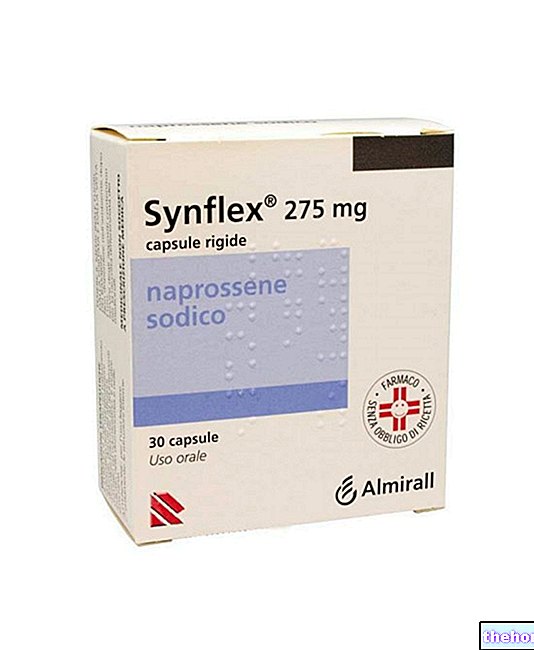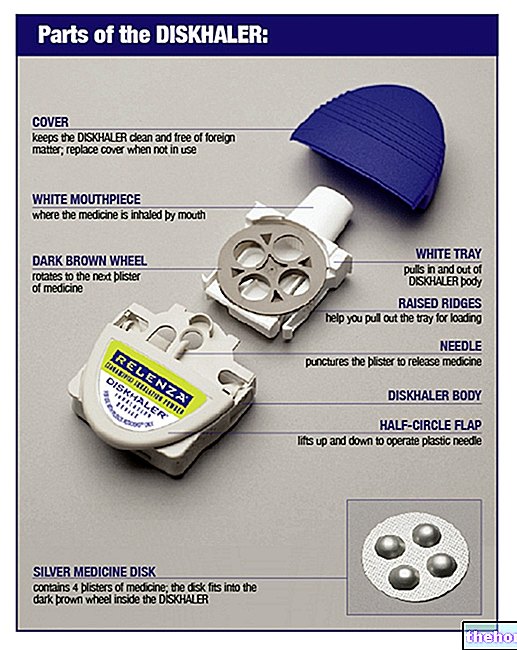GLADIO © is a drug based on Aceclofenac
THERAPEUTIC GROUP: Non-steroidal anti-inflammatory and antirheumatic drugs

Indications GLADIO ® Aceclofenac
GLADIO ® is successfully used in the treatment of painful inflammatory conditions of the osteo-articular and musculoskeletal system, both of rheumatic and extra-rheumatic origin.
Aceclofenac, especially in injectable solution, is successfully used in the treatment of acute pain of various kinds (post-operative, colic, gouty)
Mechanism of action GLADIO ® Aceclofenac
Aceclofenac, active ingredient of GLADIO ®, is a derivative of arylacetic acid known clinically for its strong anti-inflammatory activity, and for this reason it is counted among the non-steroidal anti-inflammatory drugs.
The key action mechanism exercised by this active principle is essentially due to the ability to inhibit the action of some enzymes, known as cyclooxygenases, expressed by cells subjected to inflammatory stimuli, and involved in the transformation of arachidonic acid into prostaglandins. and prostacyclines.
These molecules, endowed with pro-inflammatory activity, can support the inflammatory process on site, increasing vascular permeability and blood flow on the one hand, and facilitating the recruitment of inflammatory cells on the other.
Therefore, the inhibition of this pathway, in addition to reducing the synthesis of the aforementioned chemical mediators, enhances that of other factors known as lipoxins, capable of attenuating the inflammatory process by limiting the damage exerted at the level of the tissues involved.
Given the natural tropism of aceclofenac, mainly directed at the joint level, the above actions are carried out above all on the musculoskeletal system.
Studies carried out and clinical efficacy
1.ACECLOFENAC IN DENTAL PRACTICE
Int J Oral Maxillofac Surg. 2006 Jun; 35: 518-21. Epub 2005 Nov 8.
Analgesic efficacy of aceclofenac after surgical extraction of impacted lower third molars.
Presser Lima PV, Fontanella V.
Work that demonstrates the efficacy of aceclofenac also in common dental practice.
In fact, the study shows how the intake of 100 mg of aceclofenac can significantly reduce the pain associated with the extraction of a molar, especially after 6 hours from the operation, a period in which there is the maximum pain peak.
2 .L "ACECLOFENAC IN THE TREATMENT OF PRIMARY DISMENORRHEA
Eur J Obstet Gynecol Reprod Biol. 2006 Dec; 129: 162-8. Epub 2006 May 3.
The efficacy and safety of aceclofenac versus placebo and naproxen in women with primary dysmenorrhoea.
Letzel H, Mégard Y, Lamarca R, Raber A, Fortea J.
Work that seeks to extend the therapeutic applications of aceclofenac beyond the musculoskeletal ones.
More precisely, the intake of 100 mg of aceclofenac has been shown to be effective in reducing the pain associated with primary dysmenorrhea in young women.
3. ACECLOFENAC AND ADVERSE REACTIONS
Primary Aten. 2003 Jun 30; 32: 122-3.
Intramuscular aceclofenac and necrosis at the point of injection with fatal outcome.
Palop Larrea V, Belenguer Varea A, Cuesta Romero C, Mallent Añón J
Case report demonstrating potential side effects associated with intramuscular administration of aceclofenac. The presence of excipients such as propylene glycol and benzyl alcohol could in fact enhance the hypersensitivity reactions associated with the active ingredient, causing necrosis at the injection site.
Method of use and dosage
GLADIO ®
Aceclofenac 100 mg coated tablets;
Aceclofenac 100 mg powder for oral suspension;
Powder and solvent for solution for injection for intramuscular use of 150 mg of aceclofenac / 4 ml of solution;
Suppositories of 200 mg of aceclofenac.
The dose of 200 mg daily, to be divided into two different administrations every 12 hours, appears to be effective in the symptomatic treatment of the main inflammatory diseases.
The use of intramuscular GLADIO ® must necessarily be supervised by your doctor, who in turn must define the correct dosage schedule.
We remind you of the need to adjust the dosage used in patients with kidney or liver disease or in elderly patients.
GLADIO ® Aceclofenac warnings
The use of non-steroidal anti-inflammatory drugs should be understood as a short-term symptomatic therapy, aimed above all at the improvement of painful symptoms.
Prolonged treatments over time could in fact facilitate the appearance of side effects, in some cases even serious, exacerbating any pathological conditions already present, especially affecting the gastric mucosa.
Elderly patients or patients suffering from renal, hepatic, gastro-intestinal and cardiovascular diseases, in which the incidence and clinical severity of possible side effects is of greater importance, should take GLADIO ® with particular caution and under the constant supervision of their doctor, the which in turn should monitor hepatic, renal and cardiovascular function parameters.
The patient should also notify his doctor immediately, following the appearance of side effects of any kind, possibly providing for the possibility of promptly discontinuing treatment.
It is also useful to remember how the contextual intake of food can delay the intestinal absorption of aceclofenac, however reducing the irritative action on the gastric mucosa, thus proving useful in patients suffering from gastric diseases, in which it should also be evaluated the possible need to resort to the use of gastroprotectors.
It is recommended to start treatment with the lowest effective dose, in order to avoid the appearance of side effects.
PREGNANCY AND BREASTFEEDING
Known the key role of prostaglandins in supporting the process of cell proliferation and differentiation during the phases of embryonic development and fetal growth, it is easy to understand how the intake of GLADIO ®, during pregnancy, can suppress the expression of the aforementioned chemical mediators. compromising the normal development of the unborn child.
Studies show, in fact, how the high intake of NSAIDs during pregnancy can significantly increase the incidence of spontaneous abortions and fetal malformations.
The use of GLADIO ® in pregnancy is also not recommended due to the potential side effects induced by aceclofenac on the mother such as the increased risk of bleeding and the reduction in the frequency of uterine contractions.
Interactions
One of the typical characteristics of non-steroidal anti-inflammatory drugs, therefore also of aceclofenac, is represented by the numerous drug interactions, which make taking NSAIDs insidious.
More precisely, pharmacokinetic studies show how the contextual intake of
- Oral anticoagulants and serotonin reuptake inhibitors, could increase the risk of bleeding;
- Diuretics, ACE inhibitors, angiotensin II antagonists, methotrexate and cyclosporine could exacerbate side effects, especially those in the kidney;
- Non-steroidal anti-inflammatory and cortisone drugs could intensify the variceal action of the gastric mucosa;
- Antibiotics could alter the therapeutic efficacy of both active ingredients;
- Sulfonylureas could determine an altered glycemic control, exerted by the hypoglycemic effect of aceclofenac.
Contraindications GLADIO ® Aceclofenac
The intake of GLADIO ® is contraindicated in patients hypersensitive to the active substance or to one of its excipients, hypersensitive to acetylsalicylic acid and other analgesics, suffering from asthma, nasal polyposis, hepatic, renal and cardiac insufficiency, intestinal bleeding, ulcerative colitis, Crohn's disease or a previous history of the same conditions.
Undesirable Effects - Side Effects
Different clinical trials and careful post-marketing monitoring show how the intake of non-steroidal anti-inflammatory drugs, including aceclofenac, can be associated with the appearance of different side effects, mainly concentrated at the level:
- Gastro-intestinal with the onset of nausea, abdominal pain, vomiting, diarrhea and dyspepsia and rarely gastritis and peptic ulcers;
- Nervous with central manifestations such as drowsiness, dizziness and headache;
- Cutaneous with the appearance of urticaria, rash, bullous reactions and photosensitivity;
- Blood with granulocytopenia and thrombocytopenia.
Furthermore, the chronic intake of non-steroidal anti-inflammatory drugs could increase the incidence of serious side effects affecting the cardiovascular system, liver and kidney.
Note
GLADIO © can only be sold with a medical prescription.
The information on GLADIO ® Aceclofenac published on this page may be out of date or incomplete. For a correct use of this information, see the Disclaimer and useful information page.




























